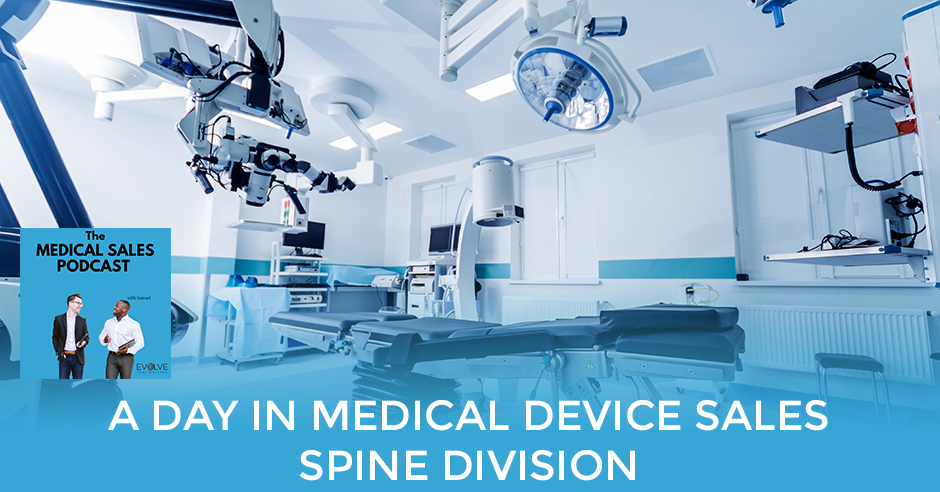
In this episode, Shannon Mays, Senior Sales Representative at Medtronic, joins Samuel as they take a snapshot of a typical day to day in the spine division in medical device sales. Shannon talks about how he got introduced into the medical sales industry as he gives an overview of his career and experience as a spinal sales representative. Get to know the grit it took for Shannon to be a consistent top-performing sales representative and the importance of humility on his journey. Learn the three main points you need to master to become an effective medical device sales representative.
—
Listen to the podcast here
A Day In Medical Device Sales Spine Division
Shannon, what’s your background? Where’d you go to college? What was your interest when you were in college or even before and about how you got to where you are?
I went to Stetson University on an athletic scholarship. I used to be a soccer player in a small D1 school in Florida. I went there for my undergrad, always a business focus. I ended up also doing grad school in my MBA program at Stetson. I’ve always in Florida, soccer, business guy my whole life and career. I was introduced to the industry by my old high school soccer coach. This guy catches up with me for many years. He was my AP Environmental Science teacher and was the head coach of the guy’s soccer team in high school. He went to Pfizer and worked in pharmaceuticals after his teaching career when he was younger. From Pfizer, he joined Medtronic and specifically in the spine division. We would keep up over the years, but he randomly reached out to me and asked me if I would be interested in looking at his career. This was when I was still in college. He’s a good old country boy from Alabama. He called me and said, “I’m going to all my national sales meetings. Everybody looks like me.”
He thought that I would be an interesting or good candidate for a specific role and wanted me to check it out. From there, I said, “I didn’t have a 100% idea of where I was going.” I was probably leaning more towards finance and commercial real estate and had some interviews with some companies. I went over and spent a day with him in surgery and the OR and it was grueling. It was super tough. It was a long day, no food, not what I was accustomed to at all, challenging customers, to say the least, a lot of yelling and screaming. At the end of the day, I left and I said, “This was great.” This guy was making a difference in there. It wasn’t an office-based career. It’s relationships involved and you were doing something that was helpful to the patients. I continued to pursue it. He wanted me to be as what we called ASR, which is an associate rep.
They offered me to take that position, which I couldn’t do because I was still in school. They want me to fill the position. The hiring manager at that time was a great guy. His name is Chris Ryan. He introduced me to a program called the APEC Program, where they interview tons of candidates, they’re going to choose five graduate students to join Medtronic and go through rotations within the company and choose their path. I went through a battery of interviews and all crazy panel interviews. I was lucky enough to be chosen for that program. My day one was June 1, 2006. I started in Memphis, Tennessee, which is the Medtronic Spine headquarters.
This was your senior year that you learned about all of this and you worked on it.
I learned about it while I was in grad school. Right after undergrad, I went straight to grad school. The reason for that is because I didn’t think my undergrad degree was going to be as useful or I didn’t think it was going to be as powerful as it once was. I felt I needed to get some type of graduate study or some type beyond higher education degree so that my resume would stick out once I went looking for a job or exploring new careers. That’s why I went straight into getting my MBA. It worked out for me because I was chosen for this program, which if I did undergrad, I don’t know if I would have been chosen.
[bctt tweet=”It takes some emotional and social intelligence to pump the brakes on your acceleration and just be humble and absorb as much as you can.” via=”no”]
Did the program specify MBA or you believe it gave you that edge?
It gave the edge. They chose five people. Two did not have graduate degrees, but ours did. Some of them were electrical engineers and more technical degrees. I was the only MBA. My focus was always going to be on the business, business development, sales and those things. It worked for me. In my senior year, I knew I was going to start interviewing for this company and during my last year of grad school, I did a huge project on Medtronic so I could learn a ton about the business and about the company. I presented it to my grad school class. It helped me a ton during my interview because I knew more about the company than maybe some of the people I even interviewed.
Your grad school was an MBA. Your college major was what?
It was Business Administration and then I did a minor study in Electronic Business. It was all business-focused. That was always the path. I had some thoughts of a legal career and also medical at some point, but it was when I stepped foot on campus and saw the business school, it was going to be all business for me.
You did have quite an entrance into the industry because you didn’t decide a company and a company in a sense approached you.
I didn’t have a full appreciation for how big of a company Medtronic was and how big of a deal. It was to get a job with this company. It’s a destination company. I didn’t realize that because it was my first job. My superiors let me know that, not in a bad way, by any means but recognize if you’re respectful of the fact that Medtronic is a destination company and expectations are super high. Later on in my career, I got to have a better appreciation and understanding of that. I’m certainly lucky in many senses and blessed to have that opportunity, but many years later, I’m still here for a reason.

What has it been like then? What did you start out with when you got into medical devices? Talk to us a little bit about what you expected it to be like? What was the day to day when you started? As you progressed throughout your career, what has changed up until where you are?
I started off being an athlete and a super disciplined, competitive guy has helped me a ton. My abilities as an athlete have taught me how to be humble. I was lucky enough to have two great mentors that I worked under as sales reps. I was there for long, grueling, crazy days. I spent doing the non-glamorous stuff of my particular role, which is moving sets and asset management, cleaning stuff up, and prepping for surgery the next day. Those are all the non-glamorous things of medical sales that people don’t know or are aware of. I knew some of it, but you have to cut your teeth in some way and learn the systems and the sets.
In the first year, your customers and the surgical techs know the systems better than you do. It takes some emotional and social intelligence to pump the brakes on your acceleration, be humble, absorb as much as you can, and play nice in the sandbox. People will take to you if you do those things. I spent a lot of time learning, listening, avoiding major mistakes, and endearing myself to my mentors and the customers around me. That’s a part of the beginning a lot of people are getting too anxious and want to go. For me, my process, my career trajectory has always been a long-term thing. It’s not a short-term game. You always have to look at it long-term. I saw a lot of people come at the same time that I have and a lot of them aren’t here. I could’ve pictured it from the beginning. I knew that was going to happen with some people, but it’s about biting your tongue, being humble, and putting your head down and going to work. That’s a lot of what we did. Money is a part of what everybody does and jumps into the career.
Money’s not always going to be there. You need to work hard to get it. That’s certainly something to keep in mind for a lot of folks in general, especially in the beginning. 100% there were days that I would literally bite the inside of my cheeks and not say something that I probably shouldn’t say. You’re the lowest person on the totem pole. You’re not going to always agree with who you work under. As far as I’m concerned, you have to listen to what they say because they know better than you do and sometimes you have to bite your tongue.
Are you talking about in the alar with clinicians or people at work?
With your counterparts, usually, if somebody’s starting, they have somebody that they’re either working under or has more experience that they’re working next to or chasing territory or something to that regard. If you’re starting, shut up and listen.
[bctt tweet=”It’s about biting your tongue, being humble, and putting your head down and going to work. ” via=”no”]
At the beginning of your career, you would go to an account hospital and you would be with another rep that’s more experienced than you that’s showing you the ropes and you’re doing procedures together.
That’s what I did, but I had exceptional guys that I worked under and I know not everybody has that experience. Some people are thrown into the fire, which is an old school mentality. People think that’s a great thing, but I don’t see how that’s helpful for anybody because you want to be cautious and if it’s my business, I don’t want to throw somebody into the fire from the beginning. Over time, you need to get people more responsibilities and duties, but they knew I was coming out of training and it would only help them for me to keep credibility with the surgeons if I don’t show how ignorant I am at the beginning.
Some of our readers have never ever heard about what happens in devices or have only been in pharma or biotech or something different. Talk a little bit about what does it look like for someone entering medical device sales? Are you normally paired with a rep in your territory and then you go in together and he or she guides you and shows you the ropes? Do you normally go in solo and someone from a different territory comes in and shows you? How does it normally work?
You’re typically going to have some type of associate role or a junior rep role and you’re working for the senior rep. The reason why I brought you on is that the senior rep business is expanding or they need more coverage help. They’ll bring on a junior person to learn the ropes and to provide coverage. Companies do use it as a bench also for when they have openings for full-on sales rep position. In my world, that’s typically how it would work. You were a junior person of some sort and you’re working directly under or for the senior rep and your daily activities are guided by what that person needs you to do for the territory. Sometimes, that junior person is shared amongst an entire district. Let’s say the district is Dallas-Fort Worth. There’s a district manager and ten full-line sales reps, that junior person may be shared throughout that geography. If one account doesn’t have stuff going on that they need you, maybe another rep at another account has stuff going on that you could help. There are a couple of different ways to do it, but it’s going to be a junior position and you’re under another full line rep.
I see that position a lot called the associate sales rep position. When you were in that position, take a snapshot of what that day looks like. If you’re sharing amongst ten different reps, it would change all the time. On general snapshot, what did your day to day look like? You get up in the morning. What was the general strategy?
Over time, it changed a little bit, but generally speaking, in the morning, I would either know going already from the night before or I would get a text early in the morning saying, “Please cover so and so’s case.” I would cover that case. I would have constant communication with the senior rep because it’s their business, operationally they know what to do, especially in the beginning. I would constantly communicate, “Almost done with there. What else do we need to do?” Before I leave the hospital that I’m at, I make sure whatever operational things we need to have done there are already completed and then I’d go on to the next place. I would check in with those with my reps throughout the day.

Over time, I didn’t have to do that. I knew exactly what I needed to do, maybe more than they did because their focus was on the sales activity. I knew operationally exactly what we needed to do. At some point, I was telling them, “We ship this out. Let’s get this set ready for tomorrow.” These guys trusted me after a while and let me take the lead on. For me, it was more I wanted to develop in general because my goal was to be a full-line sales rep. I needed to develop that part of the business at a minimum. I need to be operationally sound. Typically, your day is controlled by somebody else. That’s how I felt the associate role was. If you don’t know what you should be doing, there’s nothing wrong with having a mentor to groom you and teach you what you need to do.
When it comes to being a top-performing associate sales representative, is that a matter of organizing everyone’s different instructions as trying to utilize you to be more effective? Is that a matter of being in front of what they have to do by finding out what the business needs are a different way? What would you say?
It’s a couple of things. You need to master your job first and foremost. As an associate sales rep, you’re not the sales rep unless you’re given some of that leeway to master your role. First and foremost, I tried to get procedurally and clinically sound. I want to know the procedures. I wanted to know how to get surgeons out of issues. Should they come? I didn’t want to be the guy in there writing invoices up and being somebody in the room with a pulse, that’s not what I wanted to do. I wanted to understand how and what the surgeon’s needs were and what the clinical needs and benefits were of our systems. I want to know the stuff that wasn’t in the surgical techniques. For me, that’s super important. On my pathway, as these guys start to trust me and I started to develop relationships with customers. They gave me some sales tasks, let me get my feet wet in more of the sales process. In spine, you need to know clinically what you’re talking about before you start trying to sell these surgeons who have been sold a million times now on the same stuff.
It was getting that baseline of clinical knowledge and expertise that was super important. Going back to what I spoke about in the beginning, you need to learn how to sell yourself to even your colleagues, endear yourself to them, and gain their trust. You’re going to be sitting in the same role or finding yourself looking for a role somewhere else with a different company, if you can’t convince those guys or gals that you are prepared and ready to take on a new challenge because the hiring managers are talking to them about you. There are three main points. Number one, master my job function. Number two, making sure your colleagues are recognizing and knowing what you’re doing and you’re endearing yourself to them by your performance. Number three, start dabbling and getting into the sales. Those are three main bigger picture things an ASR, junior rep, or a newer person should be doing so that they can have opportunities for promotion.
How long did it take you to go from the ASR role into becoming an actual sales rep? What was the immediate shift for you?
It took me 2.5 years. I got offered a couple of different roles in Chicago, in Palo Alto at Stanford, and I was going to take the role in Chicago. Stanford was amazing, but I was concerned about the taxes. Moving to California was a big change for me. The role was you’re at a training facility, but I was going to take the Chicago one because I love Chicago. The reason when I went up there with my girlfriend at the time, was during winter, but for whatever reason, it was 70 degrees that day and I was, “I wasn’t going to take it.” I turned down Palo Alto and I got a last-second offer from home, which was Southeast Florida. I took that offer. I’m lucky in getting all these offers. Another thing you have to keep in mind, there’s not always going to be an opportunity for you to have promotion within the geography that you’re in. Be open to opportunities outside the geography, which I was. I took an opportunity in Southeast Florida, expansion territory, no business there. What changed immediately was I wasn’t getting calls saying, “We have these cases.” I had to go and manufacture the cases and get people to use my stuff.
[bctt tweet=”Money is not always going to be there, you need to work hard to get it. ” via=”no”]
What was that like? What type of accounts were you going into? Talk about the grind. What did that look like?
There were small community hospitals. I had a couple of little accounts in an area. I didn’t realize it at that time that I was in one of the biggest territories in the country. I didn’t realize that everybody didn’t do the amount of volume that we did. I thought that was normal for everybody, but it clearly wasn’t. I went into this little small geography and we had community hospitals throughout the area. There was no business. I started going around and knocking on doors, introducing myself to the OR staff, figuring out where if I had any assets. If I had specific sets or products that some of the hospitals may have owned of mine, then I’d go there and make sure it was functional, see who was using it. Start putting my face out there so that I’m at least seen. I started lunches with surgeons, introduced myself, and I ground up basic sales one on one activities that I started doing.
Typically, who’s your main point of contact when you first made that transition and you had to create the territory from the ground up? You were targeting who as your first point of contact? Can you talk about OR staff who talks about scheduling lunches with surgeons?
I was targeting the surgeons, period. There are a lot of people within the scope of your sales activities, but the surgeons make the decisions. I created relationships with staff, but the surgeon who’s going to make the decision on who they’re using, period. I started getting in front of the surgeons. There are certain products that we have that in the past people haven’t been there to service. I’d make sure I’d service those products and show up to cases if they’re using them to get my face out there. I slowly build that relationship, trust, and recognition in hopes of being able to do some sales activities with those people.
One hundred percent of the surgeons are who I’ve focused on for sure in the beginning. There’s one surgeon who I’m buddies with still to this day. This is right when I first started in my expansion. I would go to his office every day trying to see him and I could never see him. One day, he came out to the waiting area and he told me this later, “I was shocked that my whole staff knew who you were and talking to you.” I’m like, “I come here every Friday, trying to see you.” He laughed about that, brought me back into his office, and we sweat out a bunch of time and talk business and talk products. That was what I had to start off doing.
What was your first product on your own? How have your products changed? If you’ve had a few changes, tell us a little bit about what they were and what you sell?

We’ve had hundreds of products. I’m not sure what I specifically focused on as my first sale, but it’s more about getting a need or finding something a little bit different than what other people or other competitors already have. We have many different products. The biggest thing that’s changed over time is there are many more players in the spine industry than there were when I started. There’ve been some challenges with that. Spine went through a lull in terms of new stuff and technology. That’s completely changed in the last many years. We are focusing a lot on interoperative safety measures with navigation and robotic technology is coming to the forefront. Spine is changing a lot. I don’t focus on screws and rods. I sell procedures, new approaches, and technology in terms of robotics, navigation, and the whole procedural suite as opposed to comparing my screw angle to somebody else’s. I try to focus more on that.
Is that a strategy that you developed that’s made you effective? Is that something that Medtronic teaches?
I don’t know if we teach that. I know Medtronic is certainly investing a lot in technology. You go to certain parts of the country, they don’t have a ton of technology. For me, I’m in a competitive area. I know I need to focus on technology.
You are a sales rep and you can narrow it down to the top three that make you an exceptional sales rep. I loved how you said earlier how some people you started with that are no longer there. When you consider those people, your performance, and other top performers in your company, what would you say that stands out that if you’re doing these things at the least, you’re going to set yourself apart?
I’ve been able to gain the trust of my customers, which is huge. I’ve been in different areas throughout my career. I’ve had to get new customers many times. Over time, my customers trust me. I’m a long-term salesperson. I’m never a short-term person. I’m the filter between the company, the industry, and my customers. I tried to filter out the noise and bring them the highest quality information and technology that I can. Over time, the customers trust me. If I’m in there and helping them get through a case, that helps and long-term, they know that I’m not just there to sell them a new shiny thing, but I’m a long-term part of their team. That’s the biggest part of the whole equation. I have to be that trustworthy person that can help the surgeon and look after the surgeon’s needs and the patient’s needs. Overall, you’ll be okay. If you’re worried about how much money you’re going to make on this sale, that can work. I’ve seen it work for people and I’m sure I’ve missed sales because of it, but in the long-term, it’s going to affect you poorly. That’s my philosophy.
When you think about the rigor of this position, the tough times, whether it’s from the company standpoint and a personal standpoint, what would you say has consistently sustained you? What has allowed you to go back and remember the big picture, stay focused, play the long game that you subscribed to playing? What’s this thing?
[bctt tweet=”You need to master your job, first and foremost. ” via=”no”]
I’m married. I have two kids. Managing expectations with your family. My wife completely understands exactly what I do. In cases late at night or at one point in the weekend, I was doing surgery, it’s having that support system and understanding at home is huge. I’ve also been super lucky to have a company that trusts me and what my strategy is long-term. A lot of our sales activities are super cyclical. I was the smartest guy in the room many years ago. One of my biggest customers moved out of state, another one retired, and all of a sudden, my numbers look terrible, but I’m still that same person I would think.
I have a company that completely understands you as a professional and trust your judgment has been huge also. Patients from a company standpoint and from home make a big difference for folks. It’s a marathon, not a sprint, personally. This has never been a get rich quick thing. It’s a long-term career, you’re going to be affecting people’s lives, and you’re going to invest a lot of your time and energy in learning. You have to look at it as long-term as possible. I was lucky enough to have great mentors. I was lucky in many regards and even with the company. A lot of those factors will make a big difference for people.
What is your long-term goal? Many years out from now, what do you have your eye on in considering?
I’ve started elevating my own personal development. I know how to do this role. I’ve proven it for some time. I want to develop some of the weaker muscles that I have and I’m super involved in some of the higher-level strategic initiatives that the company has. I’ve raised my hand for a lot of different positions in terms of senior sales rep clubs that the company has to get input from sales reps. I want to continue along that pathway and having more of a hand in some of the strategic initiatives the company takes part in. Whether that means I stay at a sales rep position to do that or move into another role.
For me, the bigger picture and doing some of the strategic stuff, and in partnering with these hospitals make a lot of sense to me. Not just the surgeon as my customer, but the hospitals, the healthcare systems, the insurance payers, focusing on more of our strategic initiatives to help continue on our mission. That’s more of what I’m looking to do at this point. We have associates under our wing. I try to help these and develop them as much as possible to develop the next bench. I try to elevate my role to be more strategic in general. Not just selling stuff, but more partnering with these healthcare companies.
You have had a blessed career from the beginning to even now. If there was something you could know before starting that you wish you knew, what would it be?

The biggest thing I would want to know is that, “I can do this. Most of what will happen will be my choices.” We can control much of what we do and where we go. If I want to be the number one sales guy in the company, you can focus on that and you can achieve it. It’s about focusing on all the little things that you maybe aren’t focusing on now and stiffening up those muscles. Your development is in your own hands and where you go in this career is completely up to you. You get with some of these companies and they allow for you to explore your capabilities and develop yourself personally. Any of these companies that any of your readers are going to be looking at coming on with, have a tremendous amount of resources. Utilize those resources, develop yourself personally and you’ll be a huge asset to the company in the future.
Thank you for taking the time with us. You’ve been extremely informative. Anything else you’d like to share with our readers?
Be safe out there. The pandemic is a crazy time. There’s going to be some consolidation possibly within our industry. Hang tight and this is still a great space to be and see some of these great companies stepping up and helping out throughout the pandemic. Hopefully, this is over soon.
Thanks Shannon.
Important Links:
Love the show? Subscribe, rate, review, and share!
Join the Medical Sales Podcast Community today:



















































































